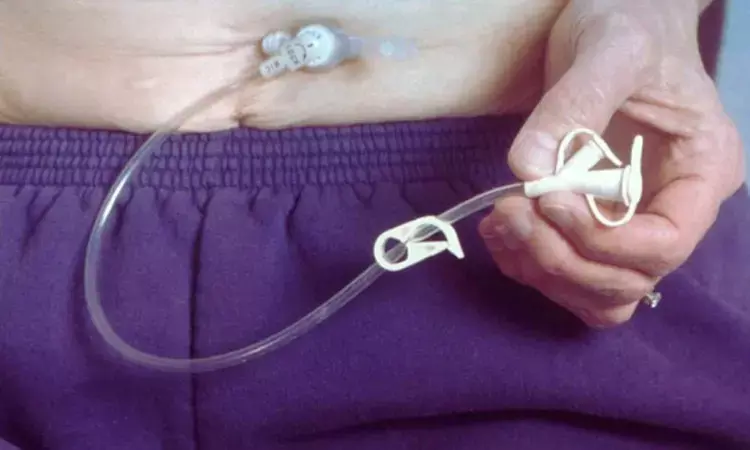- Home
- Medical news & Guidelines
- Anesthesiology
- Cardiology and CTVS
- Critical Care
- Dentistry
- Dermatology
- Diabetes and Endocrinology
- ENT
- Gastroenterology
- Medicine
- Nephrology
- Neurology
- Obstretics-Gynaecology
- Oncology
- Ophthalmology
- Orthopaedics
- Pediatrics-Neonatology
- Psychiatry
- Pulmonology
- Radiology
- Surgery
- Urology
- Laboratory Medicine
- Diet
- Nursing
- Paramedical
- Physiotherapy
- Health news
- Fact Check
- Bone Health Fact Check
- Brain Health Fact Check
- Cancer Related Fact Check
- Child Care Fact Check
- Dental and oral health fact check
- Diabetes and metabolic health fact check
- Diet and Nutrition Fact Check
- Eye and ENT Care Fact Check
- Fitness fact check
- Gut health fact check
- Heart health fact check
- Kidney health fact check
- Medical education fact check
- Men's health fact check
- Respiratory fact check
- Skin and hair care fact check
- Vaccine and Immunization fact check
- Women's health fact check
- AYUSH
- State News
- Andaman and Nicobar Islands
- Andhra Pradesh
- Arunachal Pradesh
- Assam
- Bihar
- Chandigarh
- Chattisgarh
- Dadra and Nagar Haveli
- Daman and Diu
- Delhi
- Goa
- Gujarat
- Haryana
- Himachal Pradesh
- Jammu & Kashmir
- Jharkhand
- Karnataka
- Kerala
- Ladakh
- Lakshadweep
- Madhya Pradesh
- Maharashtra
- Manipur
- Meghalaya
- Mizoram
- Nagaland
- Odisha
- Puducherry
- Punjab
- Rajasthan
- Sikkim
- Tamil Nadu
- Telangana
- Tripura
- Uttar Pradesh
- Uttrakhand
- West Bengal
- Medical Education
- Industry
Severe Dysphagia Linked to Shorter Survival and Higher Mortality After Percutaneous Endoscopic Gastrostomy: Study

Japan: A recent study found that severe dysphagia in patients undergoing percutaneous endoscopic gastrostomy (PEG) was linked to a nearly threefold increased risk of mortality (hazard ratio, 2.95).
"Patients with severe dysphagia (Hyodo-Komagane score ≥9) experienced significantly poorer survival outcomes compared to those with moderate dysphagia (score ≤8). Aspiration-related pneumonia was the leading cause of death among these patients," the researchers reported in Scientific Reports.
The researchers note that percutaneous endoscopic gastrostomy is a commonly performed procedure that provides long-term enteral nutrition for patients who are unable to eat due to conditions such as neurological disorders, head and neck cancers, and stroke. While PEG is a life-saving intervention, the overall survival outcomes of these patients can be significantly affected by several factors, including the severity of dysphagia.
Dysphagia, or difficulty swallowing, is a common symptom among individuals requiring PEG. It is often associated with a range of underlying medical conditions, particularly those affecting the central nervous system, such as stroke, Parkinson's disease, and dementia. For patients undergoing PEG, the degree of dysphagia plays a crucial role in determining post-procedure survival.
Against the above background, Kazumi Shimamoto, Department of Gastroenterology, Omi Medical Center, Kusatsu, Shiga, Japan, and colleagues examined the impact of severe dysphagia on the overall survival of patients undergoing PEG.
For this purpose, the researchers retrospectively analyzed a cohort of patients who underwent PEG between 2016 and 2021. Swallowing ability was assessed using the Hyodo–Komagane score via endoscopy. Patients with a score ≤8 were classified as having moderate dysphagia, while those with a score ≥9 were classified as having severe dysphagia. The primary outcome was overall survival, with prognostic factors identified through multivariate analysis using the Cox proportional hazards model.
The study revealed the following findings:
- Among the 107 patients, 60 (56.1%) were classified into the moderate dysphagia group and 47 (43.9%) into the severe dysphagia group. The median follow-up period was 16.7 months.
- Overall survival was significantly worse in the severe dysphagia group compared to the moderate dysphagia group.
- Multivariate analysis identified severe dysphagia as an independent poor prognostic factor (hazard ratio, 2.956).
"The study, though limited by its single-center, retrospective design, and small sample size, provides valuable insights into the impact of severe dysphagia on overall survival in patients undergoing percutaneous endoscopic gastrostomy. The findings highlight that severe dysphagia is an independent poor prognostic factor for OS, underscoring the need for careful consideration of long-term survival outcomes in these patients," the researchers wrote.
"While improving swallowing function remains challenging, PEG may still offer quality-of-life benefits for those in severe pain from nasogastric tubes. However, aspiration prevention surgery should be explored as a treatment option for patients with severe dysphagia. These findings, as first demonstrated by the authors, emphasize the importance of individualized care in managing dysphagia post-PEG, they concluded.
Reference:
Shimamoto, K., Matsui, R., Nishiyama, Y., Nishino, K., & Ban, H. (2025). Impact of severe dysphagia on overall survival after percutaneous endoscopic gastrostomy. Scientific Reports, 15(1), 1-8. https://doi.org/10.1038/s41598-025-88097-y
Dr Kamal Kant Kohli-MBBS, DTCD- a chest specialist with more than 30 years of practice and a flair for writing clinical articles, Dr Kamal Kant Kohli joined Medical Dialogues as a Chief Editor of Medical News. Besides writing articles, as an editor, he proofreads and verifies all the medical content published on Medical Dialogues including those coming from journals, studies,medical conferences,guidelines etc. Email: drkohli@medicaldialogues.in. Contact no. 011-43720751


